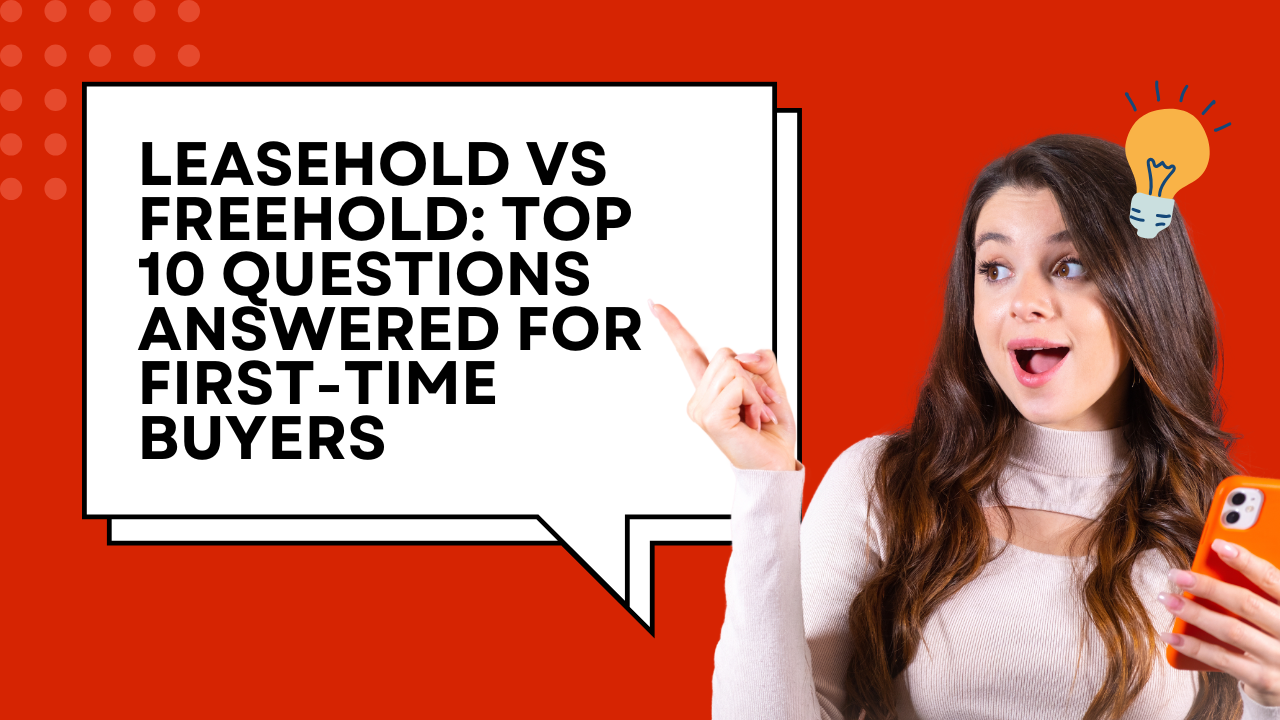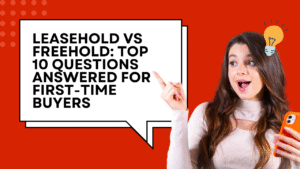Introduction: Leasehold vs Freehold Explained
When buying your first home, you’re not just choosing a location or style—you’re also choosing a form of legal ownership. The terms leasehold vs freehold may sound technical, but they carry huge financial and lifestyle consequences.
In the UK, property ownership is not always straightforward. Some buyers mistakenly assume purchasing a home means they own it outright forever. But that’s not always the case. Your ownership depends on whether your property is leasehold or freehold.
Understanding the difference is vital for first-time buyers because it affects:
-
How long you own your home.
-
What fees you pay.
-
Your rights to alter or sell the property.
-
Your ability to get a mortgage.
-
The long-term value of your investment.
In this guide, we’ll answer the top 10 questions about leasehold vs freehold, explain the pros and cons, and help you make a confident, informed decision.
1. What Is the Difference Between Leasehold and Freehold?
At the simplest level:
-
Freehold: You own the property and the land forever.
-
Leasehold: You own the property for a fixed period, but the land belongs to someone else (the freeholder or landlord).
Freehold Example:
If you buy a house as freehold, you are the permanent legal owner. You can live in it, rent it out, or sell it without additional landlord permissions.
Leasehold Example:
If you buy a flat as leasehold, you own it for, say, 125 years. You pay annual fees (ground rent, service charges) and may need permission from the freeholder for alterations. Once the lease expires, ownership reverts to the freeholder unless extended.
📌 Key Insight: Freehold means independence, while leasehold means shared responsibility and certain restrictions.
2. Which Is Better: Leasehold or Freehold for First-Time Buyers?
This depends on your goals and budget.
Freehold Benefits:
-
Permanent ownership.
-
Greater control over renovations and extensions.
-
No ground rent or service charges.
-
Better resale value.
Leasehold Benefits:
-
Lower purchase price (initially).
-
Flats and apartments are usually leasehold, which makes them more accessible in cities.
-
Building maintenance (roof, communal gardens, lifts) is shared and managed.
👉 For first-time buyers:
-
If you want long-term stability, freehold is usually better.
-
If you want to get on the property ladder in a city, leasehold may be your only option.
3. How Long Does a Leasehold Last?
Leases vary in length, but common terms are 99 years, 125 years, or 999 years.
-
Over 100 years left: Generally safe.
-
80–100 years: Acceptable, but extension may be needed later.
-
Under 80 years: Risky, as property value drops and extension costs rise sharply.
-
Under 60 years: Mortgage lenders rarely approve loans, making the property difficult to sell.
📌 Pro Tip: Always ask your solicitor to confirm the exact lease length before making an offer.
4. Can I Extend a Leasehold?
Yes. Leaseholders usually have the legal right to extend after owning for two years.
-
An extension usually adds 90 years to the term.
-
Ground rent may be reduced to a “peppercorn rent” (essentially zero).
-
The cost depends on the property value, ground rent, and current lease length.
👉 Warning: The shorter the lease, the higher the cost to extend. Extending early saves money.
5. What Fees Do Leasehold Owners Pay?
Leasehold ownership often comes with ongoing costs, including:
-
Ground rent: A yearly fee to the freeholder (sometimes small, but some can be high).
-
Service charges: Cover maintenance of communal areas like gardens, lifts, and hallways.
-
Administration fees: Charged by the freeholder for permissions, paperwork, or transfers.
-
Major works costs: Unexpected bills for large repairs (e.g., replacing a roof).
In contrast, freehold owners pay only standard costs like council tax, insurance, and personal maintenance.
6. Can I Make Changes to a Leasehold Property?
Leaseholders face restrictions, such as:
-
Needing permission for structural changes (loft conversion, extensions).
-
Limits on subletting or running a business.
-
Rules about noise, pets, and shared spaces.
Freeholders, however, generally have full freedom to make alterations, subject only to planning permission and building regulations.
7. What Happens When a Leasehold Expires?
When the lease ends:
-
Ownership of the property returns to the freeholder.
-
You no longer own the property unless you extend the lease beforehand.
-
If you’ve invested heavily in the home, this could mean losing value.
👉 This makes lease extensions essential to protect your investment.
8. Do Lenders Treat Leasehold and Freehold Differently?
Yes. Mortgage lenders typically prefer freehold properties because they are more secure.
-
For leaseholds, lenders usually require 70–80 years remaining.
-
Shorter leases may mean higher interest rates, reduced loan amounts, or outright rejection.
For first-time buyers, this means a leasehold property with a short lease can limit mortgage options significantly.
9. How Does Leasehold vs Freehold Affect Property Value?
-
Freehold homes: Hold value better, attract more buyers.
-
Leasehold flats with long leases (80+ years): Generally stable in value.
-
Leasehold with short leases (<80 years): Value decreases, often sharply.
Example: A flat worth £250,000 with a 90-year lease could drop to £200,000 if the lease falls below 70 years.
10. Should First-Time Buyers Choose Leasehold or Freehold?
Your choice depends on:
-
Budget – Leasehold may be more affordable upfront.
-
Location – In city centres, most flats are leasehold.
-
Long-term plans – Freehold offers long-term security, while leasehold may need ongoing management.
Tip for First-Time Buyers: Always calculate not just the purchase price, but also the lifetime costs (service charges, ground rent, lease extensions).
FAQs: Leasehold vs Freehold
Q1: Is it better to buy leasehold or freehold?
Freehold is better long-term, but leasehold may be the only option for flats.
Q2: Can I buy the freehold of my leasehold property?
Yes, through enfranchisement, where leaseholders collectively purchase the freehold.
Q3: What happens if I don’t extend my lease?
The value drops, selling becomes difficult, and eventually ownership reverts to the freeholder.
Q4: Do leasehold properties always have service charges?
Almost always, especially for flats, since costs are shared for communal upkeep.
Q5: How much does a lease extension cost?
It depends—anywhere from £5,000 to £50,000+, depending on value and years left.
Q6: Are there government reforms to leasehold?
Yes. The UK Government is planning reforms to reduce unfair ground rents and make extensions easier.
Q7: Can leasehold owners be forced to pay for repairs?
Yes, if it falls under communal responsibility (like roof repairs in a block of flats).
Q8: Is freehold always better?
Not always—flats often work better as leasehold for shared maintenance, but houses are usually better as freehold.
Conclusion: Leasehold vs Freehold for First-Time Buyers
Buying your first property is a huge step. The decision between leasehold vs freehold is about more than just money—it’s about control, long-term value, and security.
-
If you want full ownership and control, freehold is the better option.
-
If you are buying a flat in a city, leasehold is often the only choice—but make sure the lease is long and costs are clear.
Final Tips for Buyers:
-
Always check the lease length.
-
Ask about service charges and ground rent.
-
Seek legal advice from a qualified solicitor.
-
Consider future costs, not just the purchase price.
With the right knowledge, you can make a confident choice and secure a property that works for your lifestyle and financial future.




